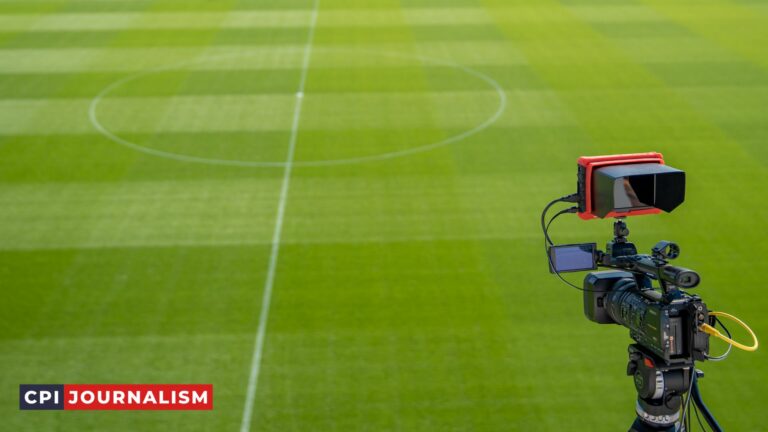How Do Sports Journalists Balance Objectivity And Personal Opinions?
As an experienced journalist, I’m often asked how sports journalists balance objectivity and personal opinion when writing stories.
This is an important question, as sports journalism involves providing accurate, unbiased coverage of sports-related news and events.
In my experience, the key to achieving this balance lies in understanding the differences between facts and opinions and in developing a set of ethical guidelines to ensure that personal opinion does not interfere with reporting.
In this article, I will discuss how sports journalists can create a balance between objectivity and personal opinion in their reporting.
A. Overview of the Challenges Sports Journalists Face
Sports journalism is a fast-paced, ever-evolving field that presents numerous challenges for journalists.
It requires a keen eye for detail, a thorough understanding of the rules and regulations of the sport, and the ability to objectively report on the events and players of the day.
As a sports journalist, it’s essential to have the ability to stay impartial and unbiased when covering events, as personal opinions can quickly come into play and affect the accuracy of the reporting.
One of the biggest challenges that sports journalists face is balancing objectivity and personal opinions.
It can be difficult to remain impartial while covering a game or event, especially when the news is being reported in real-time. It’s also difficult to remain objective when covering a team or player that the journalist may have a personal connection to or a strong opinion about.
In these cases, it’s important for journalists to find ways to remain impartial, such as avoiding using personal pronouns or making assumptions about the outcome of the game.
Another challenge that sports journalists face is staying up-to-date on the latest developments in the industry. As sports are constantly changing, journalists must remain informed about the latest rules, regulations, and trends in order to provide accurate and timely reports.
Additionally, journalists must be able to think on their feet and adjust their reports as needed based on the news of the day.
Finally, sports journalists must also be able to manage their time effectively in order to meet deadlines. With so much to report on, it can be difficult to stay on top of all the news and still have enough time to write and fact-check stories.
It’s important for journalists to stay organized and prioritize the stories that are most important and timely.
Overall, sports journalism is an ever-changing field that presents a variety of challenges for reporters. It’s essential for journalists to stay impartial and up-to-date on the latest developments in order to provide accurate and timely reports.
Additionally, managing time and staying organized are essential components of successful sports journalism.
II. Objectivity in Sports Journalism
Objectivity is the cornerstone of sports journalism and the primary objective of all journalists. It is vital for sports journalists to remain objective and unbiased when reporting on sports events and news, as their reporting will shape the opinions of their audiences.
Therefore, journalists must be aware of their personal biases and strive to be as impartial as possible in their reporting.
Sports journalists must strive for objectivity and avoid expressing their personal opinions when reporting on sports.
This means that they should not use their privilege as a journalist to influence their readers or viewers towards a certain opinion. Instead, they should report on the facts objectively, without any bias or judgment.
Good sports journalists understand that they are not just reporting on the facts, but they are also informing the public’s opinion on the matter.
As such, they should strive to be as accurate and impartial as possible when reporting on any sports-related event or news.
For example, a journalist should not use inflammatory language when discussing a team’s performance or make sweeping generalizations about athletes or teams.
Furthermore, sports journalists should also be aware of their own potential biases and strive to remain impartial in their reporting. Journalists should not let their personal beliefs, opinions, or feelings about a team, athlete, or sporting event influence their reporting.
Instead, they should strive to remain objective, and report on the facts without any personal judgment.
Finally, sports journalists should also strive to maintain a level of professionalism and integrity when reporting on sports.
This includes avoiding sensationalism and tabloid-style reporting, as well as avoiding any type of profane language. Additionally, sports journalists should also be aware of the potential legal implications of their reporting and strive to adhere to the laws and regulations of the country in which they are reporting.
In conclusion, objectivity is the cornerstone of sports journalism and all journalists must strive to remain as impartial and unbiased as possible when reporting on sports-related events and news.
Good sports journalists understand that their reporting can shape public opinion, and therefore, they should strive to be accurate and objective when reporting on any sports-related event or news.
A. The Role of Objectivity in Sports Journalism
Objectivity is an integral part of sports journalism. It is essential for a journalist to maintain impartiality and fairness when reporting on sporting events.
This means that the journalist should avoid giving personal opinions or biases in their reporting, and instead focus on providing factual information to the reader. Objectivity also helps to ensure that journalists are not influenced by any external pressures, such as sponsors or advertisers.
The role of objectivity in sports journalism is to ensure that readers are not presented with biased or one-sided views.
This is important as sports fans expect to receive news and updates that accurately reflect the current state of the sport. Objectivity helps to ensure that readers are not presented with an opinion that is not based on the facts.
Objectivity also helps to ensure that a journalist is not influenced by any external pressures. For example, if a journalist is being paid by a sponsor to write an article in favour of a particular team, they should not be influenced by this and should instead focus on providing accurate and impartial reporting.
In addition, objectivity helps to ensure that a journalist is not swayed by their own personal biases. It is important for a journalist to remain unbiased and to avoid letting their own opinions affect their reporting.
This is especially important in sports journalism, as readers rely on the journalist to provide them with accurate information rather than their own personal opinions.
Objectivity is an essential part of sports journalism, and it is important for journalists to remain impartial and unbiased in their reporting.
By maintaining objectivity, journalists can ensure that readers are presented with factual and unbiased information, without being influenced by any external pressures or personal opinions.
B. The Need for Objectivity in Sports Journalism
As experienced sports journalists, we understand the importance of objectivity in reporting sports news and events. In order to be a successful journalist, it is imperative that we maintain a level of professionalism and impartiality when reporting on sporting events.
Objectivity in sports journalism is important for various reasons. Firstly, it allows us to present an unbiased opinion when reporting on sports events and news.
This means that readers can rely on our reports to be factually accurate and without any form of personal bias. Secondly, it helps to protect our credibility as journalists and ensure that readers trust the information we provide. Lastly,
it prevents us from making statements or assertions that may be considered inappropriate or offensive by our readers.
In order to maintain objectivity in our writing, it is important to ensure that we do not allow our personal opinions to influence our reporting. This means that we must take extra care to research the facts before making any statement or assertion about a sports event or news story.
We must also be aware of our language and the tone we use when writing about sports, as this can have a significant impact on how our readers interpret our reports.
Finally, it is important to remember that objectivity does not mean that we must present an impartial report. Instead, we must strive to make sure that our stories are balanced and fair, presenting both sides of the story in an unbiased manner.
By doing this, we can ensure that our readers have access to accurate and reliable information about sports events and news.
C. Strategies for Maintaining Objectivity
Good journalism relies on objectivity, and sports journalists must be especially conscientious about maintaining it.
Here are some practical strategies for achieving and sustaining objectivity in sports journalism:
1. Do Your Research: Research the team, players, and coaches thoroughly and objectively. This will help ensure that you have the facts and figures needed to inform your reporting.
2. Avoid Bias: Try to remain as neutral as possible when reporting. Don’t let your personal biases about a team, player, or coach influence your reporting.
3. Seek Out Different Perspectives: Speak with multiple sources, from coaches and players to fans and critics. Their perspectives can help you craft a more comprehensive and balanced story.
4. Take Time To Reflect: Step back and think about how your reporting could be perceived, both positively and negatively. This will help you remain objective and avoid any potential biases.
5. Acknowledge Your Personal Opinions: If you have strong personal opinions about a team or player, make sure to include them in your story. This will show readers that you’re being open and honest about your feelings.
By following these strategies, sports journalists can ensure that their reporting is fair and balanced. This will help them maintain their objectivity and credibility as journalists.
D. Examples of Objectivity in Sports Journalism
As an experienced sports journalist, I can say that objectivity is a skill that can be honed with practice. There are many examples of objectivity in sports journalism that aspiring journalists can emulate.
First, sports journalists should always strive to provide accurate, unbiased reporting no matter the situation. This means avoiding personal biases and reporting objectively on the facts.
This can be difficult especially when the subject matter is controversial, but it is essential to maintaining journalistic integrity.
Second, sports journalists should avoid using inflammatory language or making sweeping generalizations. As part of providing accurate reporting, it is important to be precise and factual in the language used to describe a situation. This can help to maintain objectivity and prevent readers from becoming overly opinionated.
Third, sports journalists should strive to provide context and perspective when reporting on a story.
This can help to bring the story into focus and make it easier for readers to understand the situation. For example, when reporting on a controversial sports event, a journalist should provide an overview of the event and all relevant facts about the situation.
Finally, sports journalists should be careful not to make assumptions or draw conclusions based on their personal opinions.
It is important to report on the facts and provide objective analysis rather than making personal judgments. This will help ensure that readers can form their own opinion based on the facts presented.
Objectivity is an important part of sports journalism and something that all aspiring journalists should strive for. By following these tips and examples, aspiring journalists can hone their skills and become more objective in their reporting.
III. Personal Opinion in Sports Journalism
As a seasoned sports journalist, I firmly believe personal opinion has a place in sports journalism. This is not to say that objectivity should not be upheld, but rather that there is a way to balance personal opinion and objectivity.
First and foremost, it is important to recognize that sports journalism is a form of storytelling. It involves not just facts and figures, but also the human element. As a journalist, I am able to bring my own expertise and perspective to the story.
This allows me to provide a unique and interesting perspective on a particular game or situation.
At the same time, it is important to remember that personal opinion should never overshadow the facts. A journalist should strive to remain unbiased and provide an accurate portrayal of the facts. If personal opinion does come into play, it should be done judiciously, and only after all the facts have been relayed.
Finally, it is important to remember that personal opinion can be a powerful tool in sports journalism.
It can provide an additional layer of insight and analysis that can help readers to better understand a particular situation or game. In this way, personal opinion can be a valuable asset in sports journalism.
In conclusion, as a seasoned sports journalist, I firmly believe that personal opinion has a place in sports journalism, as long as it is balanced with objectivity.
It can provide an additional layer of insight and analysis, and can help readers to better understand a particular situation or game. As long as personal opinion is used judiciously, it can be a powerful tool in sports journalism.
A. The Role of Personal Opinion in Sports Journalism
As an experienced sports journalist, I understand the importance of objectivity in reporting on sporting events.
It is crucial to maintain a sense of neutrality and impartiality in order to provide an accurate account of the facts. However, I also believe that a journalist should be allowed to express their personal opinion in certain situations.
When it comes to sports journalism, personal opinion can provide valuable insight into the context of the story being reported.
For example, a journalist may be able to provide a unique perspective on a particular player or team based on their own experiences. This can help to provide the audience with a more comprehensive understanding of the game.
Furthermore, personal opinion can also be used to create engaging content. By offering a more subjective take on a sporting event, a journalist can create a more interesting read for their audience.
This can be especially useful for stories surrounding controversial topics, as it can provide a more objective perspective on a contentious issue.
At the same time, it is important to note that a journalist should always strive to be impartial and unbiased when reporting on a story. Personal opinion should be used sparingly and should never be used to sway the opinion of the reader.
In addition, a journalist should always give equal weight and coverage to all sides of a story, regardless of their personal opinion.
In conclusion, personal opinion can be an invaluable tool when used responsibly in sports journalism.
It can provide the audience with a unique perspective on a particular event, while also creating engaging and thought-provoking content.
However, it should always be used in moderation and should never replace impartiality and neutrality when reporting on a story.
B. The Need for Personal Opinion in Sports Journalism
The truth is that sports journalism is far from an exact science. There is an inherent need to balance objectivity with personal opinion when it comes to reporting on sports events.
While a journalist should strive for objectivity in reporting the facts, personal opinion can provide a unique perspective on a given event or situation.
By providing insight into the impacts of a given event, personal opinion can offer a valuable point of view that a purely objective report would not be able to provide.
It can also help to capture the emotion and significance of the moment that may otherwise be overlooked. This can help to give the reader a deeper understanding of the event and why it is important.
In addition, personal opinion may be the only way to address certain topics or situations where there is no clear answer or side to take.
It allows a journalist to provide their own thoughts and analysis, rather than simply presenting the facts. As such, it can be crucial in providing context to complex or controversial issues.
Ultimately, personal opinion is an essential part of sports journalism. It can provide valuable insight into the events being reported, as well as provide a unique point of view to the reader.
While it should be used sparingly and with caution, it can be a powerful tool in helping to make sense of a complex and often emotionally charged situation.
C. Strategies for Incorporating Personal Opinion
As a sports journalist, it is important to maintain a level of objectivity in your reporting. But, at the same time, it’s also important to be able to express your personal opinion on a subject.
Here are a few strategies to help you balance objectivity and personal opinion when writing about a sporting event or athlete:
1. Identify your opinion: When inserting your personal opinion, it’s important to make it clear that it is your own opinion and not a fact. This can be done by using phrases such as “in my opinion” or “I believe”. This will help avoid any potential confusion and make it clear that your opinion is subjective.
2. Provide evidence: When expressing an opinion, it’s important to back it up with evidence. This could include citing statistics, quoting other experts, or providing examples. This will help to strengthen your opinion and make it more convincing to the reader.
3. Be respectful: It’s important to remember that you are dealing with opinions, so it’s important to be respectful of other people’s opinions. Even if you do not agree with an opinion, it’s important to remain professional and respectful.
4. Be open-minded: It’s important to be open to different opinions and views. Even if you do not agree with them, it’s important to be open to hearing other people’s perspectives. This will help to broaden your understanding of the situation and help you to form a more balanced opinion.
By following these strategies, sports journalists can effectively balance objectivity and personal opinion in their reporting.
It is important to be aware of the potential implications of expressing a personal opinion, but it is also possible to do so in a responsible and respectful manner.
D. Examples of Personal Opinion in Sports Journalism
One of the most prevalent examples of personal opinion in sports journalism is in the analysis of players, teams, and performances. For example, a journalist may express their opinion on the performance of a certain player in a game or a team’s strategy.
This type of analysis requires the journalist to make a judgment on the quality of play or strategy and is often based on their experience and expertise in the sport.
Another example of personal opinion in sports journalism is in the coverage of controversial topics or issues. For example, when a team or league is embroiled in a scandal or when there is a debate around a particular issue, sports journalists may give their opinion on the matter.
This type of opinion is often based on the journalist’s understanding of the issue, their values and beliefs, and their opinion of how the matter should be handled.
Finally, sports journalists may express their opinion in the form of editorials and opinion pieces. These types of articles give journalists the opportunity to express their opinion on a variety of topics related to sports, such as player contracts, team performances, and league policies.
These pieces are often based on the journalist’s experience and expertise in the sport, as well as their opinion on the matter at hand.
IV. Balancing Objectivity and Personal Opinion
Balancing objectivity and personal opinion can be a tricky task for any sports journalist, but it is a necessary skill for any professional in the field.
As a journalist, it is important to be aware of your own biases and to strive to be as objective as possible when reporting on a story.
At the same time, it is also important to be able to provide a personal perspective on a story. Personal opinion can add a unique and engaging angle to a story and provide the reader with a more well-rounded view of the situation.
The key to balancing objectivity and personal opinion is to always strive for accuracy and fairness. As a journalist, it is important to be aware of your biases and to double-check your facts.
Additionally, it is important to be conscious of the language you use when writing a story and to avoid language that could be perceived as biased or inflammatory.
When it comes to expressing personal opinion, it is important to be aware of the potential consequences.
For example, if you are a journalist covering a controversial topic or athlete, it is important to remember that you could risk alienating certain readers if your opinion is too strong.
It is also important to be aware of the potential ethical implications of expressing a personal opinion.
Ultimately, it is important to remember that being a journalist is all about finding the right balance between objectivity and personal opinion. With the right amount of self-awareness and conscious effort, any journalist can be successful in finding the right balance.
A. The Challenges of Balancing Objectivity and Personal Opinion
For sports journalists, balancing objectivity and personal opinion can be a difficult task. On the one hand, journalists must strive for accuracy and impartiality in order to maintain the trust of their readers.
On the other hand, journalists must also express their own opinions and perspectives in order to create engaging and thought-provoking content.
The challenge lies in striking the right balance between these two elements. If a journalist is too impartial, their work can become dull and uninspiring.

If a journalist is too opinionated, their work can come across as biased and untrustworthy. Finding the right balance between these two elements is essential for any sports journalist.
One important way of striking this balance is to make sure that the facts are presented accurately and fairly, before personal opinion is expressed.
This ensures that readers have the right information, and then can form their own opinions based on this information. This also ensures that any opinion expressed is based on facts, rather than on personal bias.
Another important way of striking the balance is to be transparent about personal opinion. This can be achieved through making sure that any opinion expressed is clearly identified as such, and not presented as fact. This helps to ensure that readers understand that opinion is being expressed, rather than facts.
Finally, it is important to be aware of how personal opinion may be perceived by different readers.
It is important to remember that different readers may have different opinions and perspectives on any given issue, and that personal opinion should be expressed in a way that is respectful and inclusive of all perspectives.
In conclusion, balancing objectivity and personal opinion in sports journalism is a difficult but essential task.
By ensuring that facts are presented accurately and fairly, by being transparent about personal opinion, and by being aware of how personal opinion may be perceived, sports journalists can ensure that their work is engaging, accurate and trustworthy.
B. Strategies for Balancing Objectivity and Personal Opinion
1. Understand the Core Principles of Objectivity: As a journalist, it is essential to understand the fundamentals of objectivity and how it applies to sports journalism. This includes being honest, impartial and unbiased in reporting. It also means avoiding sensationalism, exaggeration and misrepresentation of facts.
2. Be Clear and Concise: When writing about sports, it’s important to be clear and concise in order to avoid any potential confusion and misunderstanding. This is also true when it comes to balancing objectivity and personal opinion. It’s important to give readers accurate and unbiased information, but also to express personal opinion in a respectful and balanced manner.
3. Include Different Perspectives: When covering a story, it is important to include different perspectives and points of view. This will provide readers with multiple angles on an issue and will allow them to make their own informed decisions.
4. Be Open to Criticism: As a journalist, it is important to be open to criticism and feedback, as it is an important part of the job. It’s important to be able to accept criticism and use it constructively to improve your work.
5. Maintain Professionalism: Maintaining professionalism is key when balancing objectivity and personal opinion. This includes being respectful of others and their opinions, as well as avoiding inflammatory language or personal attacks.
6. Think Before You Speak: It’s important to think before you speak or write, and to ensure that your words are not taken out of context. This will help ensure accuracy and fairness in your reporting, and will help you remain unbiased and objective.
C. Examples of Balancing Objectivity and Personal Opinion
Balancing objectivity and personal opinion in sports journalism is a delicate task, but it is possible to do with practice. The key is to provide accurate and unbiased reporting while still being able to present your own opinion in a responsible manner.
Here are some examples of how to effectively balance objectivity and personal opinion in sports journalism:
1. Be familiar with your subject: Before you write a story, make sure you are familiar with the topic and all of the facts associated with it. This will help you provide accurate reporting while still allowing you to present your own opinion.
2. Research thoroughly: It is important to research thoroughly when writing a story. Make sure you are familiar with all of the facts and can provide accurate information to your readers.
3. Use quotes to support your opinion: If you feel strongly about an issue, use quotes from experts or other sources to support your opinion. This will help you provide a balanced perspective while still being able to share your opinion.
4. Use a personal touch: Don’t be afraid to add your own personal touch to the story. This can help you to provide a unique perspective and make your story more interesting.
5. Present both sides: Presenting both sides of an issue is essential in sports journalism. Make sure to provide an unbiased opinion while still presenting both sides of the story.
By following these tips, you will be able to effectively balance objectivity and personal opinion in your sports journalism. With practice, you will be able to become a successful sports journalist and provide quality, unbiased reporting.
V. Conclusion
As an experienced sports journalist, I can confidently say that balancing objectivity and personal opinions is a difficult but essential skill to have.
The ability to effectively separate personal biases from the facts and present them in a way that is both informative and engaging can be the difference between a successful sports journalism career and one that falls short.
It is important to remember that readers are looking for both the facts and the opinion of the writer and it is our job as journalists to provide both.
The key is to be able to distinguish between the two and to ensure that readers know which is which. Objectivity is paramount when it comes to reporting the facts and providing accurate information.
At the same time, the opinion of the writer can add a unique perspective to the story and can provide readers with a different angle to consider.
Ultimately, striking the right balance between objectivity and personal opinion is a delicate task and requires practice and dedication. With continuous practice and the right attitude, it is possible to achieve the ideal balance between the two and become a successful sports journalist.
A. Summary of the Challenges Sports Journalists Face
As sports journalists, we face many challenges as we strive to provide accurate and objective coverage of sports events and stories.
One of the greatest challenges we face is the balancing of personal opinions with factual coverage. We are often expected to express our views, while ensuring that our reporting is unbiased and fact-based.
We also have to contend with the pressures of deadlines. As journalists, we are expected to be on the scene of sporting events, often with little time to prepare for our coverage. We must be able to quickly assess the situation, collect accurate information, and deliver our stories in a timely manner.
Additionally, as sports journalists, we must be aware of the potential for conflicts of interest. We must ensure that our coverage is free of any biases or personal interests. We must also be mindful of potential legal issues, such as copyright infringement and libel.
Finally, sports journalists must be aware of the potential for criticism from fans and players. We must be prepared to face criticism, while maintaining our objectivity and focus on delivering accurate and unbiased coverage.
B. Summary of Strategies for Balancing Objectivity and Personal Opinion
1. Know Your Role: As a sports journalist, you must know the difference between providing factual information and offering your personal opinion. It is important to understand the role of a journalist, and the ethical responsibility to be objective and unbiased in your reporting, while also providing meaningful commentary and analysis.
2. Don’t Over-Personalize: When writing, try to avoid making your story too personal, and instead focus on the facts. If you do choose to include personal anecdotes, make sure that they are relevant and do not compromise the overall objectivity of your piece.
3. Remain Neutral: As a journalist, it is important to remain neutral in your reporting. While you may have personal opinions on the subject matter, it is important to remain impartial and provide balanced coverage.
4. Respect Your Sources: In order to maintain objectivity, it is important to respect the opinions and perspectives of your sources. Regardless of your personal views, it is important to remain open-minded and respectful of the perspectives of others.
5. Separate Opinion and Fact: As a journalist, it is important to be able to differentiate between opinion and fact. When providing analysis, it is important to clearly explain the facts and then offer your opinion on the matter.
6. Seek Multiple Perspectives: When writing, it is important to seek out multiple perspectives and opinions on the subject matter. This will help to provide a more balanced and objective view of the situation.
7. Verify Your Sources: When providing information and analysis, it is important to verify your sources and ensure that they are reliable. This will help to maintain the objectivity of your story and ensure that you are providing accurate information.
C. Final Thoughts on Balancing Objectivity and Personal Opinion
For journalists, it is important to maintain objectivity while also providing their own commentary and opinions. This can be difficult to achieve, but with practice and dedication, it is possible to become an effective journalist who is able to provide both objective and subjective reporting.
As a journalist, it is essential to be aware of the boundaries between objectivity and personal opinion. Objectivity means reporting the facts without bias, while personal opinion involves expressing one’s own thoughts and feelings on a topic.
When writing, it is important to keep these two elements separate, as blending the two can lead to confusion and misinterpretation.
It is also important to be aware of the context of the situation and to not let personal opinion overshadow the facts.
When presenting an opinion, it is important to make sure it is grounded in facts and not simply an expression of one’s own views. It is also important to consider all perspectives and to be open to different points of view.
Finally, it is important to be aware of the potential for bias in reporting. While it is impossible to be completely unbiased, journalists should strive to present information in a balanced and fair manner.
Being aware of one’s own biases and making an effort to eliminate them can help to ensure that objectivity and personal opinion are balanced in reporting.







